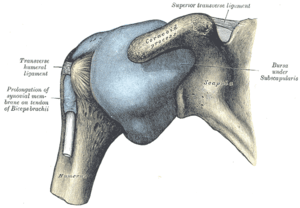Transverse humeral ligament
The transverse humeral ligament (Brodie's ligament[1]) forms a broad band bridging the lesser and greater tubercle of the humerus. Its attachments are limited superior to the epiphysial line. By enclosing the canal of the bicipital groove (intertubercular groove), it functions to hold the long head of the biceps tendon within the bicipital groove.
| Transverse humeral ligament | |
|---|---|
 Capsule of shoulder-joint (distended). Anterior aspect. (Transverse humeral ligament labeled at center left.) | |
| Details | |
| From | greater tubercle |
| To | lesser tubercle |
| Identifiers | |
| Latin | Ligamentum transversum humeri |
| TA | A03.5.08.005 |
| FMA | 38406 |
| Anatomical terminology | |
References
This article incorporates text in the public domain from page 319 of the 20th edition of Gray's Anatomy (1918)
- "Definition: transverse humeral ligament from Online Medical Dictionary". Retrieved 2008-01-13.
This article is issued from Wikipedia. The text is licensed under Creative Commons - Attribution - Sharealike. Additional terms may apply for the media files.